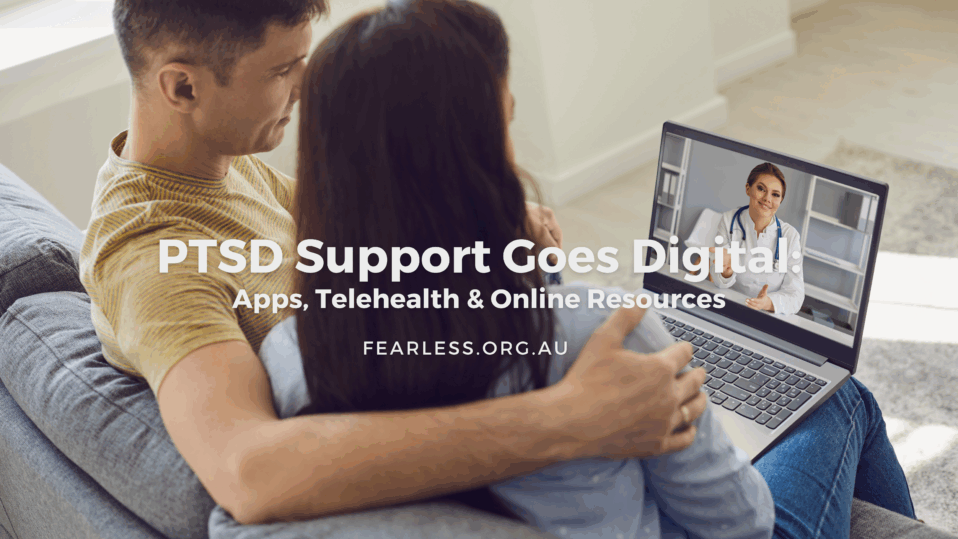Not everyone can or wants to access PTSD support in person. Whether you live in a rural town, work long shifts, or just prefer more privacy, digital tools can help you manage post‑traumatic stress in ways that work for your life.
At FearLess, we believe support should be flexible, accessible, and ready whenever you need it. In this digital age, PTSD support has gone online and is helping more people reach out in their own time and in the privacy of their own home.
1. PTSD Support in Your Pocket
Apps like PTSD Coach Australia are free, evidence-based, and built for people living with trauma. Features include:
- Grounding and breathing exercises
• Tools to manage triggers and flashbacks
• Mood and symptom tracking
• Guided audio to help with sleep and anxiety
These tools are always on hand – great for moments when you need support between sessions or aren’t ready to speak to someone yet.
For more daily support strategies and ideas, visit our blogs page where we post useful and informative articles about bettering mental health.
2. Talking to Someone Online
You don’t need to sit in a waiting room to talk to a professional. Many psychologists, counsellors, and social workers now offer telehealth sessions via secure video platforms.
- In Australia, the Better Access initiative allows up to 10 Medicare-subsidised therapy sessions per year (including telehealth). A referral from your GP is required.
• In New Zealand, many ACC-funded providers offer telehealth sessions for people dealing with trauma-related injuries or mental health conditions.
To explore options, visit our Getting Help page.
3. Self-Guided Online Clinics & Programs
Digital mental health clinics give you structure and support without needing to commit to full therapy sessions right away:
- MindSpot – A government-funded online clinic offering free assessments, PTSD-focused treatment courses, and phone support with clinicians.
• Mental Health Online – Offers structured programs for trauma, anxiety, and stress, plus optional therapist support.
Both platforms are confidential, free, and accessible from anywhere in Australia.
4. Additional Online Counselling Options
Some people prefer global platforms like BetterHelp, which offers flexible therapy with licensed professionals via app or web. While not covered by Medicare, some Australians use it for its convenience and availability of therapists outside standard hours.
Important: BetterHelp is a private service and not government-funded. It’s worth comparing with local telehealth options, especially if cost or insurance is a factor.
5. Trusted Directories & Helplines
Not sure where to start? Use these trusted sources to connect with help:
• Healthdirect Australia – For 24/7 helplines and local service referrals
• Lifeline (13 11 14) – Crisis support and counselling referral
• Beyond Blue – Peer forums, mental health info, and a helpline (1300 22 4636)
More information on how to get help can be found on our Getting Help page.
Stay informed via our Blogs and helpful Webinars.
Digital Support Is Still Real Support
For many people, especially those in rural areas or facing barriers to face-to-face care, digital tools are a lifeline. Whether it’s an app, a chat with a counsellor, or a structured online course, real help is available without leaving home.
Recovery doesn’t look the same for everyone. What matters is finding what works for you and using it when you’re ready.
FearLess is a charity supporting individuals and families affected by post‑traumatic stress across Australia and New Zealand. The resources in this post are for general information only and do not replace medical or psychological advice. Please consult a qualified provider for your personal needs.



Post a comment